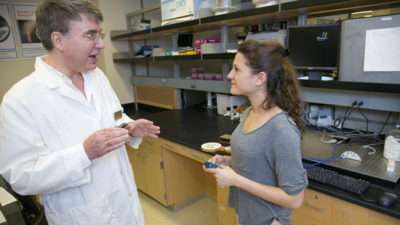UMKC Awarded $1.4 Million for Diabetes Treatment Development
The University of Missouri-Kansas City School of Pharmacy has been awarded a $1.4 million grant from the National Institutes of Health for work on a new approach for artificial pancreas development to help the tens of millions of people who have diabetes.
The lifetime burden of constantly checking blood sugar and injecting insulin is significant. UMKC research has developed a way of delivering insulin to diabetics that eliminates pumps and most injections.
“We’re aiming to improve the lives of diabetics all over the world,” said UMKC pharmacy professor Simon Friedman, the primary investigator on the grant.
Normally, diabetics must inject themselves with insulin three to five times per day, to enable the body to absorb blood sugar. The amount of insulin needed and timing vary with what an individual eats and their activity level.
For several years, Friedman and his lab associates have been developing a method in which a single injection of a new material called a PAD (photoactivated depot) can take the place of multiple normal insulin injections and allow for minute-by-minute automatic updating of insulin release. The material is injected into the skin like insulin, but lies dormant until a beam of light stimulates release of insulin, in response to blood sugar information. The latest grant is for development and testing of new, high-efficient, insulin-releasing PAD materials.
Karen Kover, associate professor of pediatrics at the UMKC School of Medicine and Children’s Mercy, is also participating in the project, assisting with the testing of new materials.
Reviewers of the grant application praised the work: “Engineering photoactivated insulin materials with biodegradable polymers is highly significant since these will provide a new method to deliver insulin in diabetics and has a potential to transform the lifestyles and patterns of diabetic patients.”
The project is supported by the National Institute of Diabetes and Digestive and Kidney Diseases at the NIH, in their program “Diabetes Impact Award-Closed Loop Technologies: Development and Integration of Novel Components for an Automated Artificial Pancreas System.”
In people with type 1 diabetes, the pancreas no longer makes insulin. Patients need insulin shots to process sugar from meals.
People with type 2 diabetes make insulin, but their bodies don’t respond well to it. At first the pancreas produces extra insulin to make up for it. But over time it isn’t able to keep up and can’t make enough insulin to keep blood sugar at normal levels.
About 29.1 million children and adults in the U.S. — 9.3 percent of the population — have diabetes, according to the American Diabetes Association. More than 25 percent use insulin shots. About 86 million people age 20 and older in the U.S. have prediabetes.
Complications from diabetes include heart disease and stroke, high blood pressure, blindness, kidney disease, nervous system damage and amputation.
| Stacy Downs, Strategic Marketing and Communications

